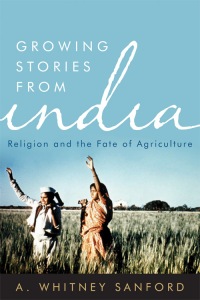Growing Stories: Religion and the Fate of Agriculture
— with forward by Vandana Shiva
The costs of industrial agriculture are astonishing in terms of damage to the environment, human health, animal suffering, and social equity, and the situation demands that we expand our ecological imagination to meet this crisis. In response to growing dissatisfaction with the existing food system, farmers and consumers are creating alternate models of production and consumption that are both sustainable and equitable. In Growing Stories from India: Religion and the Fate of Agriculture, author A. Whitney Sanford uses the story of the deity Balaram and the Yamuna River as a foundation for discussing the global food crisis and illustrating the Hindu origins of agrarian thought.
By employing narrative as a means of assessing modern agriculture, Sanford encourages us to reconsider our relationship with the earth. Merely creating new stories is not enough—she asserts that each story must lead to changed practices. Growing Stories from India demonstrates that conventional agribusiness is only one of many options and engages the work of modern agrarian luminaries to explore how alternative agricultural methods can be implemented.
A. Whitney Sanford, associate professor of religion at the University of Florida, is the author of Singing Krishna: Sound Becomes Sight in Paramānand’s Poetry. She lives in Gainesville, Florida.
“This book is highly significant for its stunning cross-cultural leaps that work. Sanford’s call to environmentalists to turn their minds from wilderness to agriculture is of enduring significance.”—Ann Grodzins Gold, author of In the Time of Trees and Sorrows: Nature, Power, and Memory in Rajasthan
“This important book will be an early benchmark for the study of food, culture, and religion. It will endure and be quoted in years to come.”—Christopher Key Chapple, author of Yoga and the Luminous: Patanjali’s Spiritual Path to Freedom
“Informative and inspirational and will definitely play a role in the evolution of our new food future.” —Journal of Agricultural & Environmental Ethics
“The central effort of Growing stories from India is to identify a more mutually beneficial human-earth relationship. . . . Her idea of a more natural way for agriculture will certainly appeal strongly to India’s farmers, most of whom are keen to rediscover their organic roots.” —The Hindu
All in all, Growing Stories from India provides readers with an entry into challenging scholarly territory. The last decade has seen a rapid increase in publications focused on food, agriculture, and ecology and this book is a germane and well-timed addition to this growing discussion. This is a book worth reading. Despite a few minor quibbles, I believe that the questions raised and the concepts explored in this text are both memorable and important. Sanford’s focus on narrative and her fearless interdisciplinarity represents a worthy and unique contribution that will undoubtedly find its way onto a diverse set of syllabi and bibliographies for years to come. — Matthew T. Riley
“This is a book on theory, the environment and ecology, the production of myth, and the role of etiquette and metaphor. It is also a book of stories and of literary and cultural history. It will be pilloried by both the political right as well as the far left, but it should be essential reading for classes in religion and ecology, or in Indian mythology and cultural history. It will force any reader to think twice before going to the next big box food emporium […]” — Frederick Smith — Religious Studies Review
Whitney’s new book is informative and inspirational and will definitely play a role in the evolution of our new food future. — Frederick Kirschenmann — Journal of Agricultural and Environmental Ethics
Sanford’s…fearless interdiciplinarity represents a worthy and unique contribution that will undoubtedly find its way onto a diverse set of syllabi and bibliographies for years to come. — Worldviews

